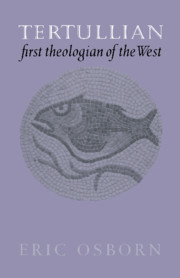Book contents
- Frontmatter
- Contents
- Preface
- Note on the text and list of abbreviations
- 1 Simplicity and perfection
- 2 The puzzle: Athens and Jerusalem
- 3 The paradox: credible because inept
- 4 Strife of opposites and faith as recognition
- 5 Antithesis in one God: ‘Against Marcion’
- 6 Trinity and christology
- 7 Prayer and the bible
- 8 Mankind's two natures and a sordid church
- 9 Argument and humour: Hermogenes and the Valentinians
- 10 Promise of laughter, judgement of hell: apocalyse and system
- 11 Ethics of conflict
- Conclusion
- Select bibliography
- Subject index
- Citations from Tertullian
- Citations from the Bible
1 - Simplicity and perfection
Published online by Cambridge University Press: 09 November 2009
- Frontmatter
- Contents
- Preface
- Note on the text and list of abbreviations
- 1 Simplicity and perfection
- 2 The puzzle: Athens and Jerusalem
- 3 The paradox: credible because inept
- 4 Strife of opposites and faith as recognition
- 5 Antithesis in one God: ‘Against Marcion’
- 6 Trinity and christology
- 7 Prayer and the bible
- 8 Mankind's two natures and a sordid church
- 9 Argument and humour: Hermogenes and the Valentinians
- 10 Promise of laughter, judgement of hell: apocalyse and system
- 11 Ethics of conflict
- Conclusion
- Select bibliography
- Subject index
- Citations from Tertullian
- Citations from the Bible
Summary
‘We also are religious and our religion is simple’, objected the Roman proconsul to the martyr Speratus, at his trial near Carthage on 17 July 180. ‘If you will listen calmly’, replied Speratus, ‘I shall tell you the mystery of simplicity.’ Tertullian was not the only African who liked paradox. Speratus claims simplicity for Christians rather than pagans. He counters the accusation that Christians are secret and sinister, by asserting that their secret is simplicity. He draws on the New Testament account of the mystery of salvation. The writer to the Ephesians had been concerned to tell the nations of the unsearchable riches of Christ and to bring to light ‘the economy of the mystery which has been hidden from all ages in the God who created all things’ (Eph. 3.9). The church declares to heavenly powers the manifold (πολυποíκιλος) wisdom of God (Eph. 3.10), which is the divine mystery. The end of salvation, the vision of Christ and the church present a great mystery (Eph. 5.32).
Tertullian's lust for simplicity, supported by superlatives, persists throughout his work and is a good place to begin a study of his thought. A fine exposition, which begins ‘Tertullien déconcerte’, goes on to insist that Tertullian took a simple and total choice when he became a Christian and that his complexity comes from his earlier intellectual formation; whether a study of his thought begins from either simplicity or complexity, it will discover a profound unity.
- Type
- Chapter
- Information
- Tertullian, First Theologian of the West , pp. 1 - 26Publisher: Cambridge University PressPrint publication year: 1997



